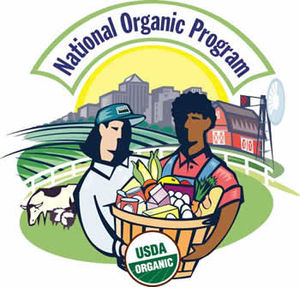When reading the full text of California’s Proposition 37, I came across an interesting exemption. California’s attorney general sums it up:
GENETICALLY ENGINEERED FOODS. LABELING. INITIATIVE STATUTE.
• Requires labeling on raw or processed food offered for sale to consumers if made from plants or animals with genetic material changed in specified ways.
• Prohibits labeling or advertising such food, or other processed food, as “natural.”
• Exempts foods that are: certified organic; unintentionally produced with genetically engineered material; made from animals fed or injected with genetically engineered material but not genetically engineered themselves; processed with or containing only small amounts of genetically engineered ingredients; administered for treatment of medical conditions; sold for immediate consumption such as in a restaurant; or alcoholic beverages.
Why exempt organic food? Is all organic food GE-free? Prop. 37 not only exempts organic food from GE-labeling, but it also is designed to protect organic farmers:
Organic farmers are prohibited from using genetically engineered seeds. Nonetheless, these farmers’ crops are regularly threatened with accidental contamination from neighboring lands where genetically engineered crops abound.This risk of contamination can erode public confidence in California’s organic products, significantly undermining this industry. Californians should have the choice to avoid purchasing foods whose production could harm the state’s organic farmers and its organic foods industry.
Is it too late to protect organic food from GE contamination?
Genetically Engineered (GE) Foods. Genetic engineering is the process of changing the genetic material of a living organism to produce some desired change in that organism’s characteristics. This process is often used to develop new plant and animal varieties that are later used as sources of foods, referred to as GE foods. For example, genetic engineering is often used to improve a plant’s resistance to pests or to allow a plant to withstand the use of pesticides. Some of the most common GE crops include varieties of corn and soybeans. In 2011, 88 percent of all corn and 94 percent of all soybeans produced in the U.S. were grown from GE seeds. Other common GE crops include alfalfa, canola, cotton, papaya, sugar beets, and zucchini. In addition, GE crops are used to make food ingredients (such as high fructose corn syrup) that are often included in processed foods (meaning foods that are not raw agriculture crops). According to some estimates, 40 percent to 70 percent of food products sold in grocery stores in California contain some GE ingredients.
Five years ago, Time reported on the problem of GE contamination and organic food production.
Albert Straus, owner of the Straus Family Creamery in the small northern California town of Marshall, decided to test the feed that he gives his 1,600 cows last year and was alarmed to find that nearly 6% of the organic corn feed he received from suppliers was “contaminated” by genetically modified (GM) organisms. Organic food is, by definition, supposed to be free of genetically modified material, and organic crops are required to be isolated from other crops. But as GM crops become more prevalent, there is little that an organic farmer can do to prevent a speck of GM pollen or a stray GM seed from being blown by the wind onto his land or farm equipment and, eventually, into his products.
I want my organic food labeled as GE-free. As the Strauss Family story illustrates, contamination occurs. Without actual product testing, there is no way of knowing for sure a product is GE-free. Natural Society explains the problem:
I know it’s been said a couple times now that organic food does not allow for GMO’s, but that’s only 99.1% true, and here’s why. In the United States, although the National Organic Program prohibits GMO’s in organics, there are no methods to prohibit GMO contamination. I used 99.1% because there will be at least a little bit of contamination. But 99.1% was really used because the EU Agricultural Ministers deemed even organic food the allowance of 0.9% GMO presence.
Prop. 37 doesn’t not provide for any testing, and their are other exemptions that are concerning:
The measure also excludes certain food products from the above labeling requirements. For example, alcoholic beverages, organic foods, and restaurant food and other prepared foods intended to be eaten immediately would not have to be labeled. Animal products— such as beef or chicken—that were not directly produced through genetic engineering would also be exempted, regardless of whether the animal had been fed GE crops.
The exemption for animal products that have been fed GE crops is upsetting and misleading.
Thankfully, Prop. 37 does try to clean up the marketing terms “natural,” “naturally made,” “naturally grown,” and “all natural” by banning them from labels of products that contain GE ingredients.

USDA Certified Organic is already not allowed to have any GM ingredients, so it does not make a difference. However, I do not like the exemption for alcoholic beverages. a lot of cheap beers and even beers stylized as premium may be using GM grain for brewing. I also do not like the exemption for animal products raised with GM feed.
You cannot trust USDA certified Organic. I bought this tea called Wulong Tea they said it was certified Organic by USDA(with the label and all) and Sucralose was in there. I bought an Olive Oil called Star from Walmart they said it was USDA approved. And on an official site they listed Star Extra Virgin Olive Oil as not real due to a test and it did not qualify as a Organic Olive Oil. So yeah the USDA can not be trusted.
Found the tea it wasn’t Wulong, I got confused I’m drinking that now and it’s benefits are great. But yeah anyway, it’s called Asian Sun, here are the ingredients, see what I mean? About the USDA? http://www.asiansuntea.com/20125.html